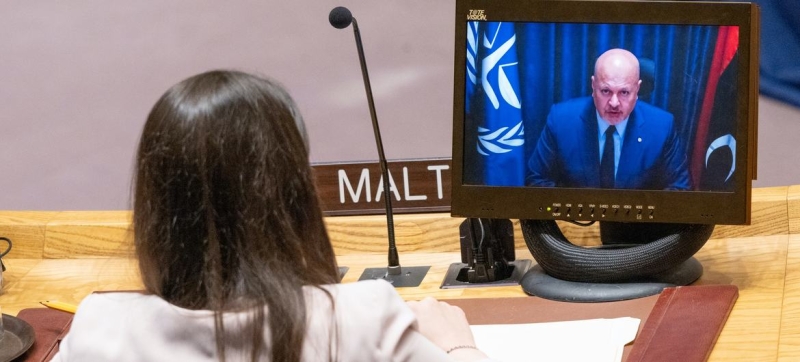
Karim Khan addressed the UN Security Council via video link. ICC prosecutor calls on international community to assist in arrests of suspects in Libya crimes International law
International Criminal Court (ICC) prosecutor Karim Khan on Tuesday called on the UN Security Council to assist in executing arrest warrants for suspects allegedly linked to a Libyan armed group accused of committing serious crimes in the city of Tarhuna, where mass graves were discovered in 2020.
The six men who remain at large were either key members of the al-Kaniyat armed group or had links to it. The group controlled Tarhuna from at least 2015 until June 2020.
Arrest warrants for Abdurahem Khalef Abdurahem Elshgagi (Al-Hani), Makhlouf Makhlouf Arhumah Douma (Douma), Nasser Muhammad Muftah Dhao (Al-Lahsa), Mohamed Mohamed Al-Salheen Salmi (Salheen), Abdelbari Ayad Ramadan Al-Shakaki (Al-Shakaki), and Fathi Faraj Mohamed Salim Al-Zinkal (Al-Zinkal) were released last month.
Justice and Accountability responsibility
Briefing the UN Security Council from the Libyan capital Tripoli, Khan described his meetings with the victims’ families. He said there were victims in every house in Tarhuna.
“They firmly believe that justice, accountability and fair trials are essential for them, their families, their communities and Libya as a whole,” the ICC Prosecutor added.
He called on the Security Council, states parties to the Rome Statute and other states to facilitate the arrest of the suspects.
Progress in Investigations
Khan also noted significant progress in investigations into detention-related crimes and incidents between 2014 and 2020. He said additional arrest warrant requests were expected in the coming months, some of which could be secret to improve the chances of arrest.
The Prosecutor stressed the need for continued cooperation with the Libyan authorities, noting the positive results of his meetings with representatives of Libyan authorities, including the Prosecutor General. Khan also announced the establishment of a new mechanism to coordinate investigations and trials.
The ICC team has increased engagement with civil society and met with more than 70 Libyan organizations and human rights defenders to discuss their expectations, he added.
Hopes of Victims
He concluded by recalling the roadmap for completing the investigative phase of the trial.
“I believe that together, through all these activities, our plans are working,” he said, stressing that the hopes and expectations of victims must remain at the forefront.
While there are many challenges and the way forward will be difficult, the rapporteur expressed confidence that solutions will be found to the problems faced which Libya has been struggling to cope for over 13 years.
Referral to the ICC
The ICC is not a UN organization, but under a cooperation agreement, the Security Council can refer a case to the court, giving it jurisdiction.
The situation in Libya was referred to the ICC Prosecutor pursuant to Resolution 1970, adopted in February 2011. By that resolution, the Council also imposed sanctions, including a travel ban, on President Muammar Gaddafi and other senior figures in his administration, including some family members.
